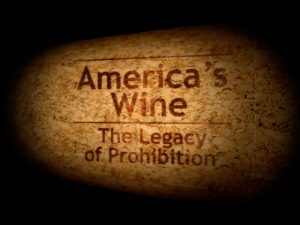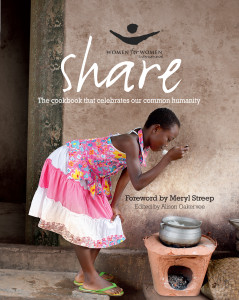 “This is a book about humanity and eating and families and sharing and caring and generosity,” Jesse Ziff Cool is a well known restauranteur and cookbook author based in Silicon Valley. She’s long been an advocate of eating locally, in season and organically, way before it was in vogue. Jesse opened Flea Street Café in Menlo Park, Calif., where her menus have reflected this way of cooking and eating for 33 years. She’s the first one to say however she’s not a chef, but “a cook.” Jesse’s a passionate person, not only about food but about causes she believes in. When she gets behind a project, she’s all in, hands-on.
“This is a book about humanity and eating and families and sharing and caring and generosity,” Jesse Ziff Cool is a well known restauranteur and cookbook author based in Silicon Valley. She’s long been an advocate of eating locally, in season and organically, way before it was in vogue. Jesse opened Flea Street Café in Menlo Park, Calif., where her menus have reflected this way of cooking and eating for 33 years. She’s the first one to say however she’s not a chef, but “a cook.” Jesse’s a passionate person, not only about food but about causes she believes in. When she gets behind a project, she’s all in, hands-on.
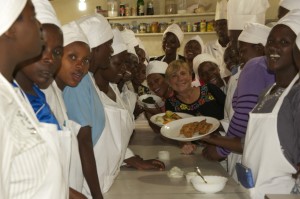
The book Jesse’s talking about is Share: A Cookbook That Celebrates Our Common Humanity. “Isn’t it joyful? It isn’t about despair, it’s about food and it’s joyful,” she says. The cookbook is the result of a three year effort by Women for Women International, an organization that works with women in war-torn countries, places suffering the consequences of recent or on-going conflicts. Places like Rwanda, The Congo, Afghanistan and Iraq.
What makes Women for Women International (WfWI) unique is that they reach out to communities to work one-on-one with women, by offering a year long sponsorship and mentorship. It’s more than financial help, it’s also emotional support and guidance in helping one woman at a time learn new skills to empower her and help her better her life , her family’s life and her community. Like many outreach organizations, WfWI depends on sponsorship from regular folks like you and me. But how do you get people to join a cause and donate not just money but time and effort when there are so many charities competing for a piece of that pie?
For Lauri Pastrone, a Silicon Valley resident who has been a volunteer with WfWI for 15 years, since she started sponsoring women, the idea that resonated with her was a cookbook. But not just any cookbook. A cookbook that tells the story of the women helped by Women for Women. A cookbook that shares their culture, traditions, and most of all, favorite recipes.
Lauri started putting together a team within Women for Women to develop the cookbook. She has no professional cooking background or training. But she did take three cooking classes from Jesse about 15 years ago. “She left a very strong impression on me,” Lauri says. “She was way out in front,” when it came to movements in food and being involved with charitable causes. So she wrote to Jesse about the Share project and asked for a recipe.
That request turned into more. Jesse came on board as a main advisor, a sounding board, helping to steer the cookbook in the right direction. “There was something different, it just swept me away, I thought this is it I’m working with them,” she says. Jesse notes that most of her giving back to the community was on a local business, but she started to think on a larger scale. “We all need to have a local and a global vision about how we take care of others,” she says, “it leads people to what it means to help around our own table and how to stretch out globally.”
Lauri and her team approached Share on a broad, global basis, seeking recipes not just from the women in the WfWI program, but also from humanitarians, other chef and cookbook authors and even a few famous politicians and celebrities. Nelson Mandela contributed a recipe; Meryl Streep authored the book’s forward along with giving a recipe. There are also recipes from Alice Waters, Sir Richard Branson, Dame Judy Dench, Ashley Judd, Paul McCartney, Nell Newman, René Redzepi, Kate Spade, Trudy Styler and Robin Wright. It’s an impressive roster but each person’s contribution feels authentic.
In addition to recipes, each contributor gave a quote related to the WfWI cause. Lauri says one of her favorites is from America Ferrera:
“Sometimes the problem seems so big that changing one life doesn’t feel like enough. But it is.”
“That’s really the whole philosophy of this book,” says Lauri. “If many of us can help one person it does make a difference.”
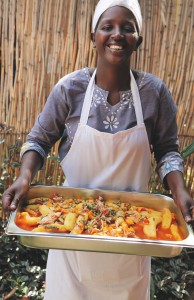
Share is rich with pictures that tell the story of the women – their lives, their families, their day to day existence. You meet 16 women, all of whom have been through the WfWI program. One of the women you’ll meet is Janviere, who was 12 years old when her parents and little brother were killed during the 1994 genocide in Rwanda. She tells of her struggles to raise two children after her husband left with no warning and she had no money or job skills. She learned of the WfWI program and applied and was accepted. She learned to cook and now works in a restaurant in Kigali and is able to support her family on her own. She says the WfWI experience was first time she felt hope since the genocide.
When Jesse Ziff Cool got involved with WfWI she sponsored a woman (called a “sister”) in Rwanda. She traveled to Rwanda with WfWI to learn more about the organization.
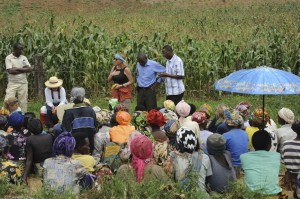
Arriving in villages when Jesse would mention she was a cook, “doors opened, we were invited when when we let them know I was hoping to have the women share their cooking, their gardens and their markets with me so I could learn more about Rwandan food.” says Jesse. She was astonished at some of the kitchen conditions — most of which were makeshift at best. In one community they visited the new bakery that WfWI built. It had thick plastic for walls and the oven was outside. Jesse says the bakery is in a “walking village,” a string of villages along roads people take to get from place to place. The bakery is run by a co-op of WfWI women. “They bake a standard bread, shaping it differently and sell it to the people walking down the long road.”
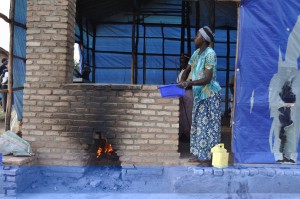
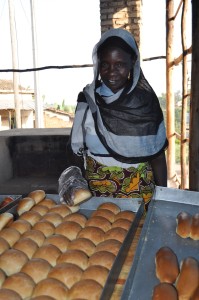
Jesse jumped right in and started baking. “We mixed flour, yeast, dried milk in big plastic bowls,” she says. “Then we kneaded the dough which was baked in a wood burning fire oven. I was in heaven.” Lauri says, “They loved having Jesse bake with them.” The experience was inspiration for a new project Jesse and Lauri are working on, “to inspire entrepreneurial creativity in small food businesses for women in places of despair,” says Jesse.
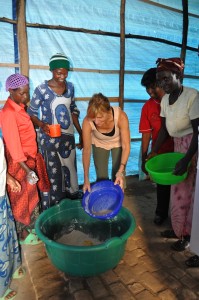
While in Rwanda, Jesse took part in cooking classes at the restaurant Heaven in Kigali. It turned into something more than a lesson for the women.
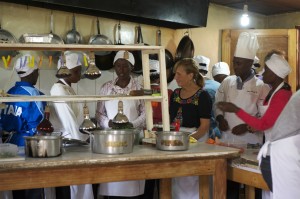
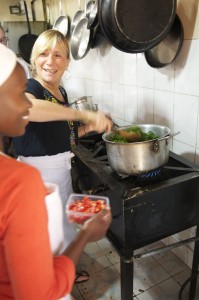
“They were women from WfWI who are part of a culinary team. They are taught traditional European cooking so they can get jobs in hotels. I asked if they would show me traditional Rwandan food, so they taught me to make some of their favorite and most commonly cooked foods. It was so beautiful, so loving and so much fun!”
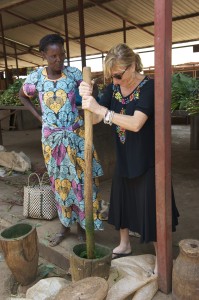
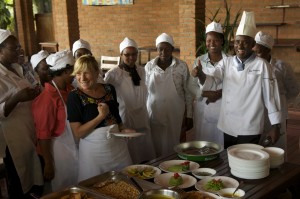
Jesse also wanted to find and meet her sister Odette. She made her way to Odette’s home, several hours from a main village, a basic hut with no running water, no power and an open fire next to the door for cooking. “To meet Odette and her family, we walked down steep mountain trails to her home. Waiting for us was a meal prepared from her garden of boiled potatoes, beans and green bananas smothered in groundnut spices. I have eaten amazing food, but this was one of the most memorable meals of my life.”
What Odette shared is what the other women in the cookbook share, and share proudly. Food is the universal language and it connects and inspires people. There are 100 recipes in Share, “It’s just regular food, it’s not fancy, it’s this mix of delicious food and you think ‘oh I can cook that.’” says Jesse.
Both Jesse and Lauri will be doing book signings and cooking classes in the San Francisco Bay Area during December and into the new year, including two cooking classes at Draeger’s Markets in Silicon Valley in March 2014.
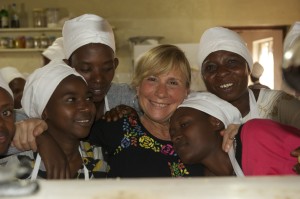
Share is more than a cookbook. The photos along make me want to go into my kitchen and cook. But the stories of the women inspire me to reach out globally. You see the power of helping just one person and how it can have a positive, even joyful impact. Share is a cookbook you must share with others in your life.

